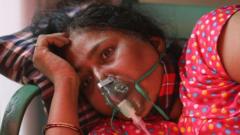On March 24, 2020, as the world braced for a pandemic, India’s government announced its first Covid lockdown, leading to a tragic collapse of the healthcare system. A shocking WHO estimate indicates over 4.7 million deaths—nearly tenfold the official figures, which the government disputes due to methodological flaws. As the fifth anniversary approaches, BBC journalists reflect on their harrowing experiences during this dire time.
Soutik Biswas recalls a fateful summer day in 2021 when he received a frantic call from a school teacher whose husband was struggling for breath in a Delhi hospital. The scarcity of oxygen had created a nightmare scenario where survival seemed increasingly impossible. With Delhi engulfed in a brutal second wave, the demand for basic resources became a matter of life and death. Biswas describes a chilling realization: “Oxygen, beds, medicine—these were now luxuries.”
Another BBC correspondent, Yogita Limaye, relates a particularly heart-wrenching moment outside a Delhi hospital, as families clamored for medical attention amid an overwhelming wave of helplessness. People were often left to navigate the crisis alone, sometimes spending days searching for available hospital beds. Limaye vividly remembers the chaotic scene in the hospital, where doctors faced the agonizing decision to ration oxygen supplies, knowing full well the human cost of such measures.
In these desperate circumstances, the journalists themselves were not untouched by loss. Vikas Pandey reflects on the personal toll, noting that many sought his help in securing medical aid for their loved ones. He narrates the story of Altuf Shamsi, who lost both his father and pregnant wife within days, starkly illustrating the pain that gripped countless families during the pandemic.
The lockdown’s emotional weight stretched beyond illness. Geeta Pandey recalls the despair as families attempted to reunite amid travel bans. The fear of carrying the virus to vulnerable loved ones meant heartbreaking choices, as the last chance to see a dying parent disappeared. This was compounded by the decision to launch the vaccination process in January 2021, which was tragically followed by a personal loss.
Anagha Pathak captures the plight of migrants stranded without support, including a pregnant woman trudging home under the sun. Limited by reporting protocols, Pathak could only provide sustenance as she documented their struggles—a poignant reminder of the sacrifices made during the lockdown.
Five years later, the emotional scars of the Covid-19 pandemic remain, with journalists committed to documenting the truth, reminding us of the resilience and suffering faced by millions. As India reflects on the past, lives lost and lives forever changed echo throughout. Through their coverage, these journalists offer a vital perspective on a nation’s struggle to survive an unprecedented crisis.



















